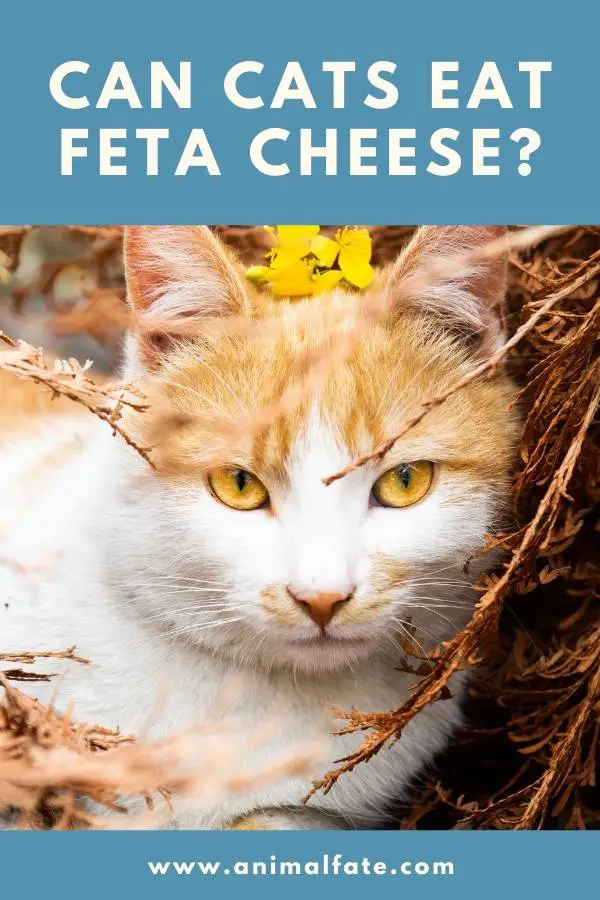The short answer is: No, cats cannot eat feta cheese. You may be asking since it contains a smaller amount of lactose compared to other cheese. Still, feta cheese has a high amount of fat and sodium, which is not suitable for cats. A small amount of feta cheese might be tolerable for cats, but it’s still not recommended.
Indeed, feta cheese has a lot of better benefits compared to other cheese in many aspects. Still, the fact remains that it can create some risks if you feed it to your pet cat.
Feta cheese contains a lot of positive effects on humans, so I did some research on how it affects cats.
Here are some of the problems I found:
Contents
Why is feta cheese a problem for cats?
Higher Lactose Content than other aged cheese
Feta cheese is famous for being an alternative cheese for lactose-intolerant people. For this reason, you may probably think that it’s also safe for your pet.
Indeed, feta cheese has lower lactose content than other cheese. Still, it has higher lactose compared to other aged cheese.
Feta cheese may be suitable for lactose-intolerant people, but not for cats.
As carnivores, felines don’t produce lactase enzymes. Thus, they don’t have what it takes to break down lactose in dairy products such as cheese.
Although there’s lower lactose, it can still upset your feline pet’s stomach. Worse, it can even lead to other digestive issues.
High Sodium Content
Even if your kitty can digest lactose in feta cheese, the sodium content is another thing to consider.
Compared to other cheese, feta cheese contains a high amount of sodium. Sodium, like lactose, is terrible for our feline pets.
Feta cheese is high in sodium content because its production uses salt in the process.
Below is a list of the sodium content of cheese per ounce (28g):
- Feta Cheese – 316mg
- Cheddar Cheese – 174mg
- Swiss Cheese – 54mg
- Parmesan – 433mg
- Mozzarella – 4mg
- Cottage Cheese – 91mg
While they may get attracted to cheese because of the saltiness, it doesn’t mean that you can let your pet eat it.
Cats don’t need salt and other seasonings, and they should eat food that contains no sodium.
For cats, food should always be unsalted and unseasoned. With feta cheese, it will only put your pet at risk.
Made with Unpasteurized Milk
The production of cheese in the early times includes unpasteurized milk. Unpasteurized or raw milk is risky for both humans and pets.
Further, it is illegal and forbidden to consume unpasteurized or raw milk nowadays. There are certain bacteria in raw milk that can be harmful to both humans and animals.
Don’t worry, though. Feta cheese production today already pasteurizes milk before creation.
Related – Can cats eat flour tortillas?
Is it OK to give cats cheese?

A lick or bite of any cheese may not harm cats. Still, it’s not okay to give cats cheese.
Some cats love cheese and can tolerate their lactose content. Still, to be safe, it’s best to prevent your feline pets from eating cheese.
It will save you from the problems of vomiting, diarrhea, and other digestive issues.
You May Also Read – Can cats eat lemon pepper tuna?
What kind of cheese is good for cats?
If possible, you should avoid giving your cat cheesy treats.
However, if you wish to spare some, give the ones that are low in lactose, sodium, and fats.
You can give a small amount of cheddar cheese. An amount with the size of the dice should be enough.
Cheddar cheese is low in lactose and may cause no harm if offered in small amounts once in a while.
Another type is swiss cheese, which is also the favorite of many health-conscious persons.
Swiss cheese is low in sodium and fat while high in protein. At the same time, swiss cheese contains significantly lower lactose. Still, it can cause harm to cats if taken in large amounts.
As a general rule of thumb, cheese that is low in lactose, sodium, and fat has fewer risks than other types. Still, these kinds of cheese should be in small amounts and not regularly.
Can cheese kill cats?
It’s unlikely for cats to die due to cheese consumption. A small amount of cheese now and then will cause no harm for cats.
Large servings and regular intake can cause vomiting, diarrhea, and other digestive issues.
Cheese can be lethal for cats if they are not taken immediately to a veterinarian.
Unlike other toxic food, cheese contains a lesser risk. Still, it’s not reason enough to let it munch on cheese every time.
Do you want to know if cats eat black pepper or rice pudding? Check it out!
What happens if you or your cat eat bad feta cheese?
Like any other cheese, feta cheese can mold if leftover some time. If left in the refrigerator for too long, it can dry out, making it unfit for consumption.
Eating an already spoiled feta cheese can cause an upset stomach to humans. It will probably have the same, or if not, the worse effect on cats.
Thus, it’s best to throw away an old feta cheese, especially if it already has molded.
Bad feta cheese already becomes unfit for consumption due to taste.
If you are to dispose of spoiled feta cheese, keep it out of a cat’s reach to avoid problems.
In Summary
Cheese, especially feta cheese, entails a lot of healthy benefits. Thus, it’s quite tempting to spare some to our cats.
Still, as much as it is enjoying for us, and even for our cats, cheese is something that you should keep away from your pet.
Your best bet is to find other snacks that are safe for your feline pet. Of course, you can give a dice of cheese every once in a while.
The important thing is to do it in moderation, and always think before feeding it.
Resources
WebMD study about cats and lactose intolerance
Image credits – Photo by Simion Andreea-Marina and Alice Donovan Rouse on Unsplash



